Football dynasties take years of planning, preparation and a host of fork in the road moments falling the right way. For the Lions, it all started with the pursuit of Leigh Matthews.
The hit list was short. Very short.
The 1998 season had been a disastrous one for the Brisbane Lions.
In the second year following the merger of Fitzroy and the Brisbane Bears, the Lions slumped to last on the ladder in a season beset by injuries and internal friction.
John Northey, who had steered the club to finals appearances in his first two seasons the two years prior, was sacked as coach with eight rounds remaining with former captain Roger Merrett installed as caretaker for the rest of the year.
As internal discussions quickly shifted to the path forward and it didn’t take long within the Lions hierarchy to establish who the club should target as its next coach.
There was just one man they had in their sights.
It became Operation: Get Lethal.
Leigh Matthews had been out of the coaching game since finishing at Collingwood at the end of 1995. But the Brisbane brains trust was convinced he was the man they needed.
Then Lions chief executive Andrew Ireland reached out to Matthews through a friend to arrange a meeting with the Magpies’ premiership coach in Melbourne.
For almost two hours, Ireland, Brisbane chairman Alan Piper and board member Graeme Downie made their pitch to Matthews.
“I spoke to Jeff Browne, who at that stage was the AFL’s lawyer but was also a good friend of Leigh’s, and we arranged to meet with Leigh,” Ireland said.
“We met with him in Melbourne, along with Alan Piper and Graeme Downie, and spent a couple of hours with him.
“At the end of the meeting Alan asked ‘What do you think, Leigh?’ Leigh said ‘Look, I reckon 95 per cent chance I won’t’.
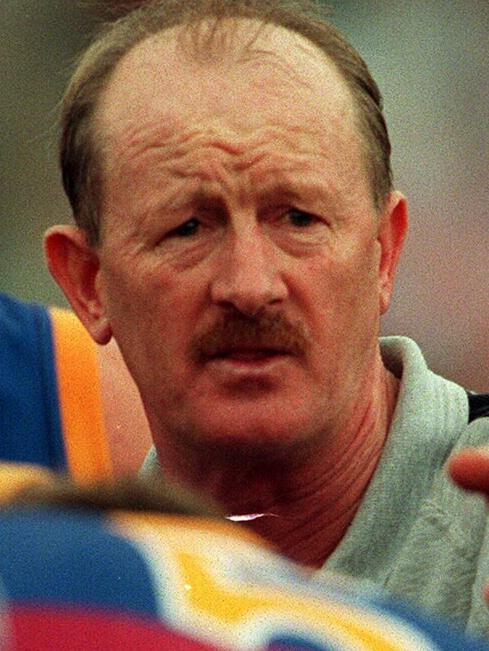
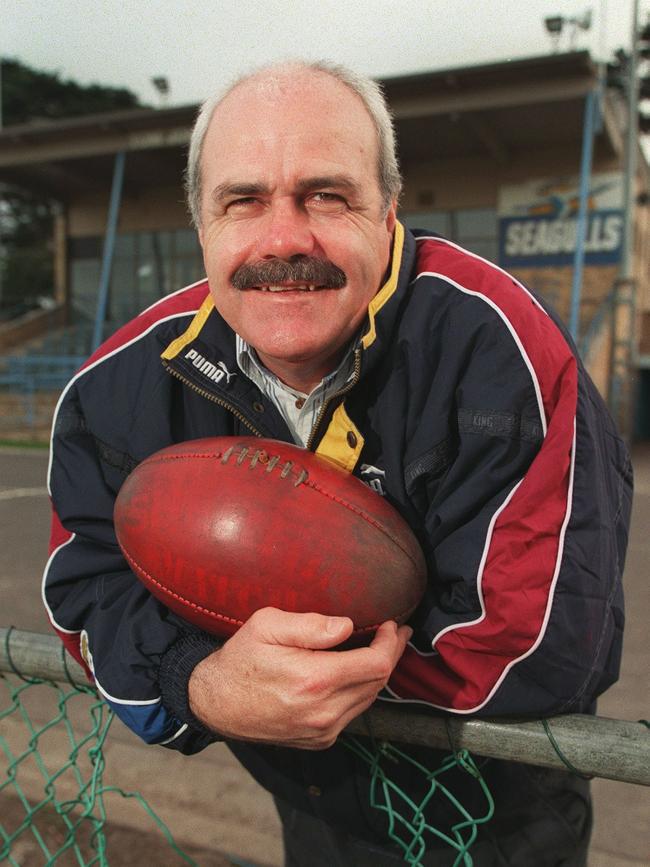
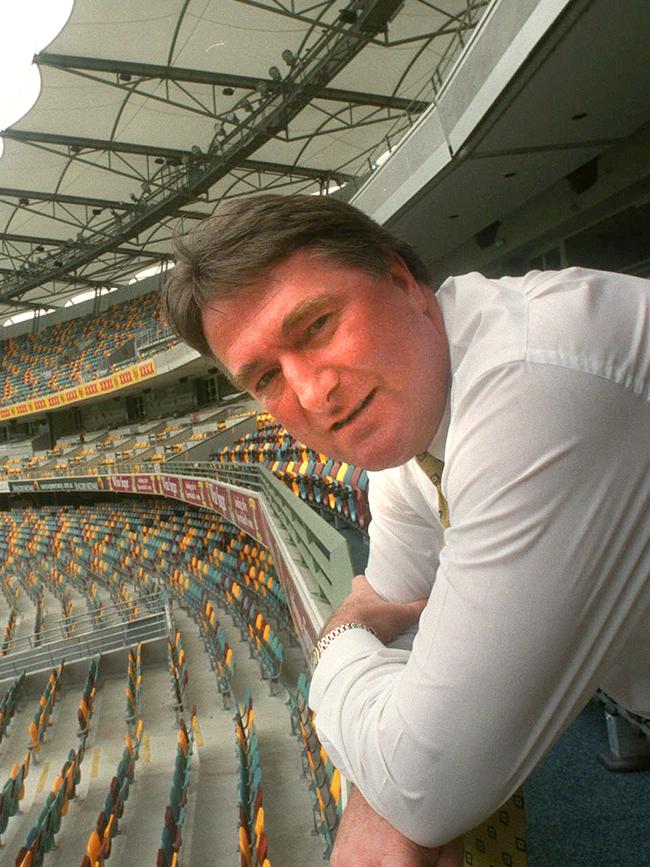
“Then Graeme and Alan left and Leigh and I actually chatted down on the footpath outside where we had met for probably 40 minutes or so.”
That’s where Ireland left the meeting – hopeful but not yet confident that Matthews could be persuaded there was still another chapter to write in his football story.
Having previously turned down an approach by Fremantle to return to the coaching game, what was going to be different this time for the four-time premiership Hawk?
Then Ireland got a call from an old cricket-playing mate and Matthews’ trusted Collingwood lieutenant, which confirmed the Lions were in the hunt.
“I actually got a call from ‘Gubby’ (Graeme) Allan, who I had known – Gubby and I had grown up as teenagers playing in the same cricket team,” Ireland said.
“Gubby rang me and said ‘Leigh is seriously considering it, you need to keep talking to him’.”
Less than a month later, Matthews was in Brisbane to commentate with Channel 7 for the Lions’ final home-and-away clash of the season against St Kilda.
Matthews called Ireland and arranged to meet up before the game.
“We met up at Alan’s place and he said ‘Yeah, I’m going to coach the team’,” Ireland said.
“He said ‘I’m happy with what you’ve offered me but I need a bit of extra money spent on sports science and conditioning, I think there’s an area that could provide an advantage for the team’.
“So he said he would coach us … while he was having the discussions (with us) and clearly he was considering it, I really didn’t know for certain until we had that meeting before the last game of the year that we had him.”
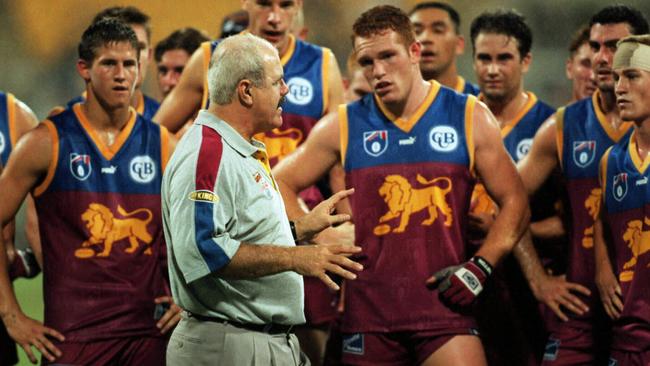
THE COACHING COMEBACK
Matthews had thought his coaching days were over.
After calling time on a 10-year coaching career with Collingwood, for which he will be forever hailed as the man who delivered the club its drought-breaking 1990 premiership, Matthews had comfortably settled into the next phase of his life, working in the media.
Until the phone call from the Brisbane Lions came towards the end of the 1998 season.
Born and raised in Melbourne’s south-east before becoming a Hawthorn legend, Matthews had never ventured far afield, let alone a move interstate.
So, the idea of a return to the coaches box took some adjusting to initially.
“I spent a few years out of coaching after Collingwood and I thought I would never coach again,” Matthews said.
“Then a couple of things happened in ‘98 and eventually I got offered the job at the Lions.
“I’m a Melbourne boy, born and bred, and I shifted about 15 kilometres I reckon in my first 45 years.
“It took a month or so to come to terms with the whole shifting interstate, coaching again, the whole thing.”
It wasn’t so much the promise of the Brisbane list, immediate expectations of more premiership glory or a sun-change that lured Matthews back.
More the opportunity, he said, to start with a clean slate, with the team he wanted around him.
“It was very little to do with the Lions, it was more to do with the fact that I was offered the job so I had something specific to consider I guess,” Matthews said.
“I had a lot of faith in Andrew Ireland, who was the CEO at the time, they allowed me to bring Graeme Allen up with me as our new football manager.
“So I guess they were prepared to let us have a fairly clean page on how we wanted the football department to be and what people we wanted to be part of our football department, so you don’t often get that opportunity.
“It was a (case of) ‘Oh well, time to accept the challenge again and jump back into that lifestyle’.”
Matthews spent his first month in Brisbane getting his football operations together.
It was the off-field – in sports science and conditioning – where Matthews felt significant gains could be made and it became an area the Lions invested heavily in.
“Leigh was very big around what you did around the team and his commitment to trying to put the best sports medicine and all the little bits around the team,” Ireland said.
“His view was you needed to make sure the environment around the players was first-class. Medical, conditioning, sports science was such a place that if you did that well, you could get a competitive advantage.
“As well as a competitive advantage, he used to talk about the fact that some of it would be definitely advantageous and make us a better team.
“The other part in his mind was ensuring that the players thought they had an advantage and he was a big one for not allowing the players any excuses by stuff that was happening around (them) so that they couldn’t point ‘That’s not good enough or this isn’t good enough’, it was very much well you’ve got this really set up around you to play your best footy.”
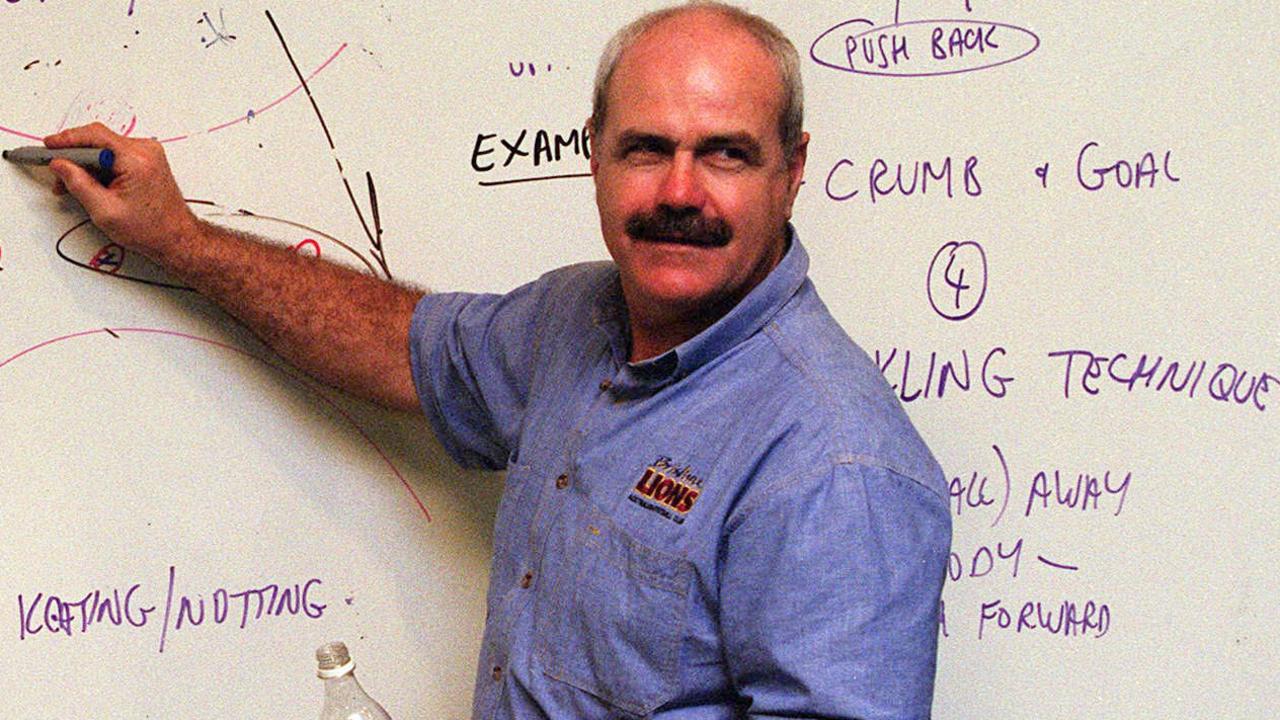
FIRST IMPRESSIONS
Matthews felt like he had walked into a casualty ward when he first met with the Brisbane players at the end of the 1998 home-and-away season.
It had been a bad year on the injury front for the Lions as co-captain Michael Voss headlined the club’s rehab group after suffering a sickening broken leg against Fremantle at Subiaco.
“The first time I ever met with the players … the thing that hit me was the amount of players in the front row with plaster on,” Matthews said.
“It was actually quite a wounded group in ’98.
“Michael Voss was recovering from his broken leg. It just hit me that there were at least half a dozen players that had plaster, in other words that had injuries that were significant, but after that you just start working with what’s there.”
Until he arrived at the Lions, Matthews said he hadn’t given much consideration to the Brisbane list, which had made finals three consecutive years before the 1998 aberration.
“The view was that we would do our best. That’s all,” Matthews said.
“I didn’t have any expectations, I don’t believe in expectations.
“You aspire to win every game and you aspire to win a premiership if you can. But that’s an aspiration.
“I had no expectations, it was basically doing the best we can with the collective group.”
If Matthews arrived at Brisbane without expectations for the Lions’ list, it was a different story for the players.
Regarded as the player of the century and the man who finally delivered the Magpies a flag after 32 years, Matthews came to the club with a big reputation.
But as he addressed the Lions’ group for the first time, co-captain Alastair Lynch had little doubt he would live up to that standing.
“We all knew he was regarded as the greatest player of all time and he had this aura about him, so you listen to start with and he was just such an impressive presenter to us,” Lynch said.
“When he speaks he makes you listen and it’s easy to understand. I think that was the early impression that I got.
“I think at that time it just made you think, ‘This is exciting now, we have got everyone on the same page’.
“We knew we weren’t as bad as the wooden spoon indicated and we had a group of young, talented players coming through together and Leigh was able to harness that talent to get it going in the right direction.”
The core of the future Brisbane premiership team was already in place when Matthews arrived at the club.
They were names that would go on to become a part of finals folklore for the Lions – Jason Akermanis, Simon Black, Daniel Bradshaw, Chris Johnson, Nigel Lappin, Lynch, Justin Leppitsch, McRae, Luke Power, the Scott brothers and Voss.
The pieces of the premiership puzzle were there.
“We just needed some direction and someone to pull us together,” Lynch said.
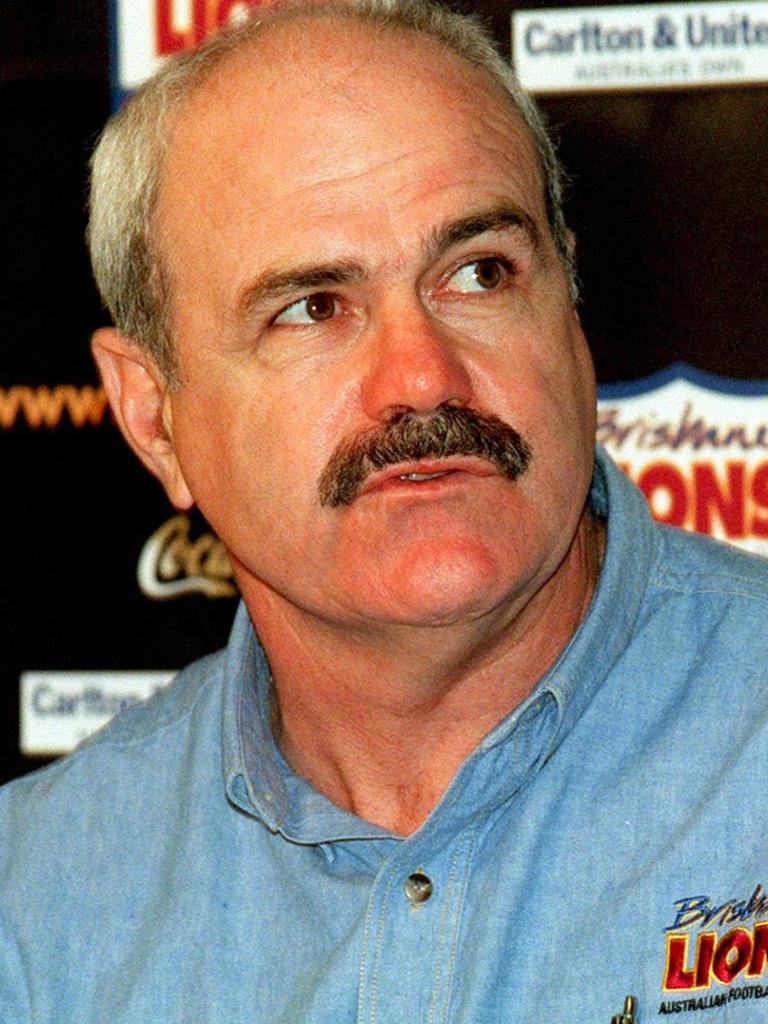
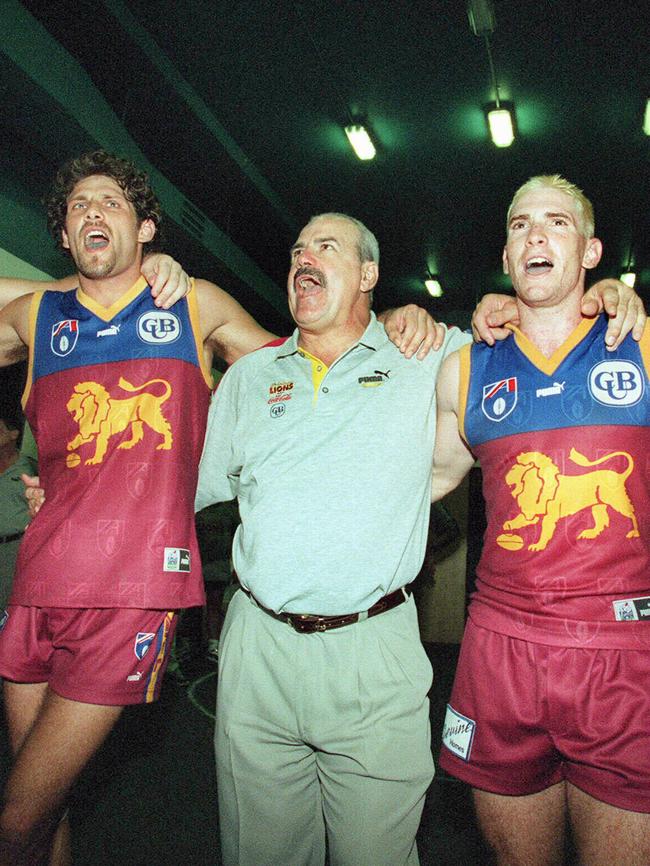
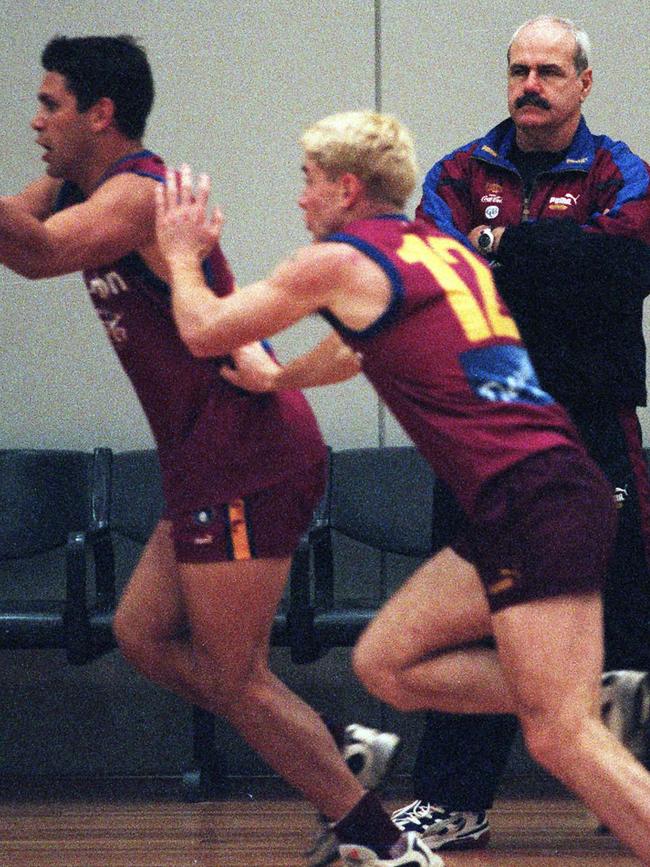
THE BOUNCE BACK
Ireland had always been confident the 1998 season had been a “glitch”.
Just two years prior, the Lions had finished third and reached a preliminary final and he was certain there was “enough talent for Leigh to work with” on the list.
“When we had been speaking to him, I really thought ‘98 was a glitch, we had played in a preliminary final only two years previously with a really young team,” Ireland said.
“We certainly sold that as a reason to come – you are coming to what we believe is a list that is only on the way up if you forget about ’98.”
But the bounce back was swifter and stronger than anyone could have hoped for in 1999.
From the wooden spoon, the Lions climbed to third on the ladder with a 16-6 record in their first season under Matthews.
They smashed Carlton by 73 points in the qualifying final, followed up with a 53-point belting of the Western Bulldogs in the semi-finals before falling by 45 points to eventual premier North Melbourne in the preliminary final.
“They bounced back from the bottom in ’98 to play in a preliminary final in ’99. You could tell straight away that he had a huge impact on the group,” Ireland said.
“The group believed in him, they believed in his philosophies and his style of game.”
Matthews believed the Lions had not been “far away” in his first season in charge.
“We had a terrific honeymoon year, we had a really good year in ‘99,” Matthews said.
“North Melbourne eventually owned it, Essendon were the champion team in 99 but Carlton of course knocked them out in the preliminary final, and we ended up getting beaten by North Melbourne in the other preliminary final.
“Michael Voss was unavailable, he injured his ankle in the first final and Chris Scott and Craig McRae I think both were suspended, so we kind of had a few of our key players unavailable.
“Then Simon Black got his eye socket fractured in the start of that preliminary final so we weren’t far off going all the way.
“In terms of the new regime, it was a valuable kick-off year that gave the playing group, the whole club some confidence and belief that we were doing the right things.”
The response was better than Lynch, who joined the then Brisbane Bears at the end of 1993, could have predicted and gave him hope the club was now in the flag discussion.
“We came last and you were hoping we would be up and competing for finals but I didn’t really think we would bounce and go that well,” the champion forward said.
“We were competitive in almost all games and had some good wins that year and it just gave us the belief that we are in the conversation for the top group.
“Now, for the first time in my career, we are actually in the conversation as a genuine premiership contender for the first time.”
While the nucleus of the future Brisbane premiership team was already in place, the 1999 national draft would deliver the Lions another young prize.
A young forward by the name of Jonathan Brown would be taken as a father-son selection at No. 30 from the Geelong under-18s to add some icing to the cake.
The Lions went on to reach the finals again in 2000 but finished fifth after suffering a heavy 82-point semi-finals loss to Carlton at the MCG in what Matthews described as a “stabilisation year at best”.
But Ireland wasn’t concerned.
“We slipped down a little but we thought we had a pretty good team,” Ireland said.
That assessment would turn out to be somewhat of an understatement in the years to come.
But no one – not the coach, chief executive or the captain – could have predicted in their wildest dreams what was to come next.
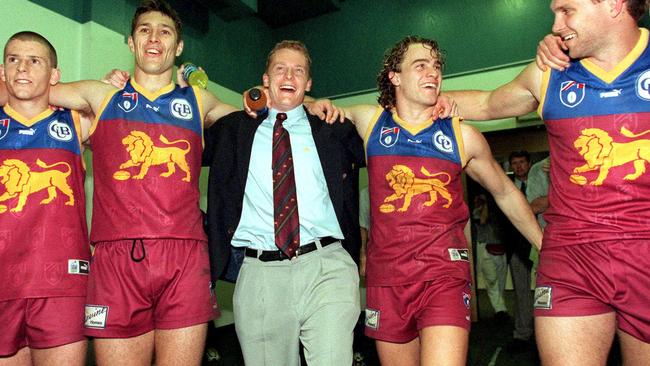
MOMENT THAT LAUNCHED A DYNASTY
The loss was the worst the Brisbane Lions had suffered under Matthews.
It was Round 8, May 19, 2001, against Carlton at Princes Park.
Blues star Anthony Koutoufides did a number on the visitors in a 36-disposal, three-goal performance as Carlton smashed the Lions by 74 points.
It was Brisbane’s fourth loss for the season and questions were starting to be asked as to whether the Lions were “dropping off”.
“We were horrible,” Ireland said.
“It was as bad as I had seen us play.
“If you had seen us that day, you would have struggled to think we would play finals.”
The following week the Lions failed to respond, suffering a five-point loss to Adelaide at the Gabba to fall out of the top eight.
If the season wasn’t already starting to look precarious, the Lions’ next assignment against the reigning premier and ladder leader Essendon had the potential to inflict another major wound on their 2001 campaign.
“We think back on that as kind of one of those at the crossroads, turning points in our year,” Matthews said.
It was early in the week ahead of the clash against the Bombers when the coach laid it all on the line in a brutally honest team meeting.
“I have no doubt it was that bad loss we had to Carlton at Princes Park that was a big turning point for us,” Lynch said.
“There was the meeting a week-and-a-half after the Carlton loss where we visited a few things around our roles and responsibilities and reinforcing the belief in our own ability to execute our roles.
“That was the meeting where Leigh spoke about that Predator movie, it was the Tuesday before the Essendon game and that was the big turning point which launched us into the next four Grand Finals.”
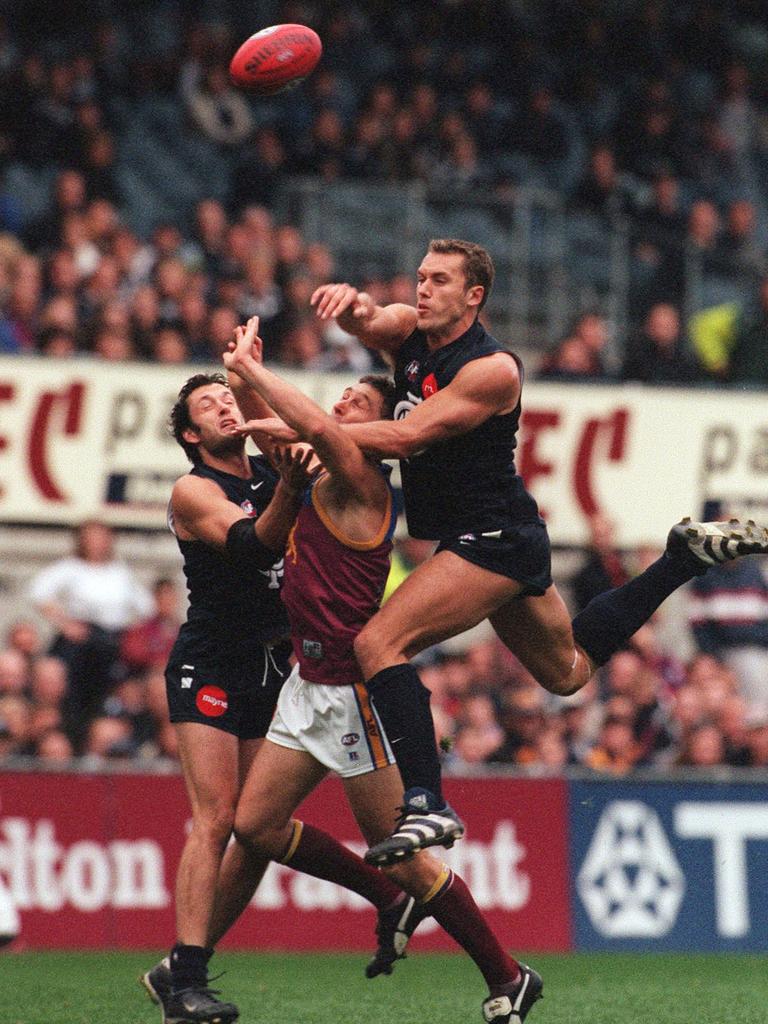
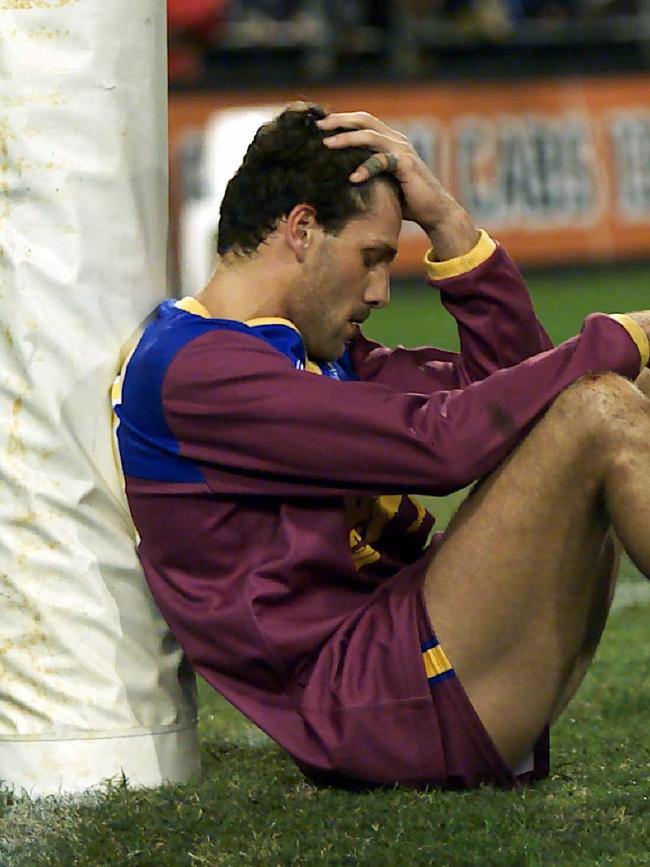
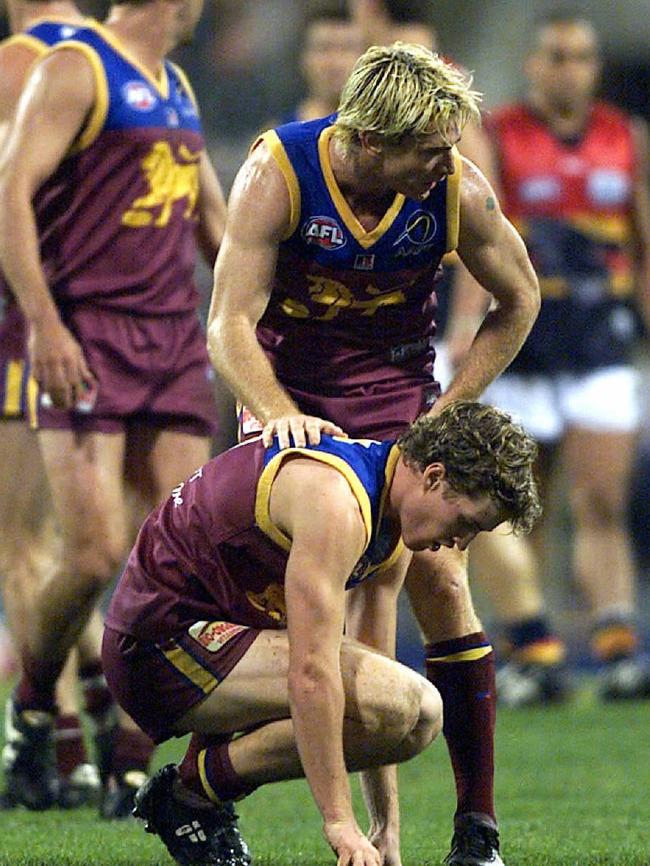
LETHAL CHANNELS ARNIE
It was a famous line from the 1987 Arnold Schwarzenegger action blockbuster Predator.
But it was one which Matthews felt delivered the perfect analogy for the challenge in front of his group against the all-conquering Bombers: “If it bleeds, we can kill it”.
The Bombers had lost just one game en route to the premiership the previous season and were expected to dominate again in 2001.
“That was one of the themes (that we used),” Matthews said.
“Every coach is looking for themes and the themes that seem to be a part of a big win seem to be the ones that people remember.
“That was just one that became a bit public, it was just a way of looking at Essendon who had hardly been beaten in a couple of years.”
While it might have triggered a chuckle among the players initially, Lynch said the message behind the quote resonated with the players.
“We had a bit of a laugh and then (Matthews) went straight out to the press conference as we were about to start training and recited that to the journos and it was plastered everywhere,” Lynch said.
“Because we hadn’t had a great start to the season there was certainly doubt in the players’ minds and he asked us about our belief in beating Essendon.
“No one was going to say we can’t beat them but we were just thinking ‘Gosh, have you seen these guys over the last couple of years? They are a super team’. So he changed the conversation around our particular roles, ‘Can you actually do your job?
“With that came the answer of ‘Yes, no doubt’. So he took the focus away from Essendon and put the focus on each individual doing their well-defined roles so the mentality within minutes went from ‘How can we beat this team?’ to ‘Yes, I know I can do that job and I know exactly what I am going to do’. That’s where things just turned around.”
The “play your role” message went a step further with the introduction of a role appreciation award for the match against Essendon.
Players would nominate other players who best played their role for the team – and it continued for the rest of the season.
“It was something that Leigh and maybe the leaders introduced going into that Essendon game,” Brisbane’s Norm Smith medallist Shaun Hart said.
“That was significant because that spoke player-to-player about what they really valued about the performance of people for the team.
“They decided to give the game ball that was signed by every player to the winner of that award and everyone would vote and give a reason to why they voted for a certain player.
“That motivated players to go and do that particular thing that they did for the team more and more week after week and I think we built from there.”
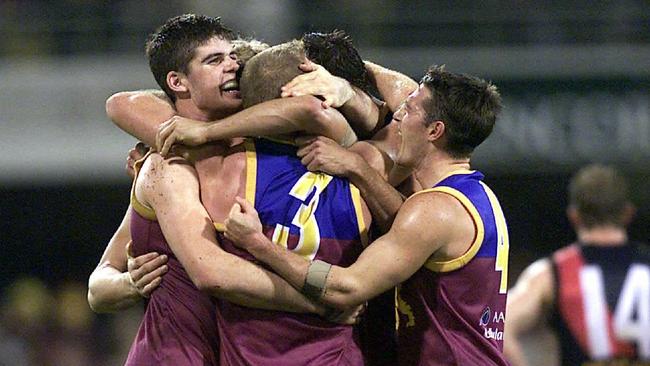
THE CHARGE
The Lions went on to defeat Essendon by 28 points in Round 10 at the Gabba in a major upset that was to change the course of the season.
Simon Black and Nigel Lappin had a game-high 27 disposals and Lynch kicked four goals.
In what Ireland described as a “light-bulb moment” for the team, the win marked the start of a 16-game winning streak for the Lions that year – a stretch that was to extend into 2002.
“If you’d asked me two weeks ahead what was the possibility of that I would have said you’d be an idiot,” Matthews said.
“Whatever happened in the build-up, the players got to the game ready to play and played well and found a way to beat Essendon.
“We continued winning and then the belief in themselves, the belief in your system, that always gets enhanced if you are succeeding. That cycle set in for the second half of 2001.”
Brisbane finished the season second on the ladder on 17 wins – equal with the Bombers.
The Lions cruised through their first finals assignment, defeating Port Adelaide by 32 points at the Gabba in their qualifying final.
Next was a preliminary final showdown against Richmond.
Jonathan Brown kicked four and Michael Voss and Lappin three apiece as the Lions won by 68 points at the Gabba to book Brisbane’s first ever Grand Final appearance – and another meeting with minor premier Essendon.
“I remember when we beat Richmond in the preliminary final, the late Danny Frawley was coach of Richmond at the time and our coaches box were in the same part of the ground,” Matthews said.
“As we walked out of the coaches box after the game, we had won fairly easily, Danny said to me ‘You can win it, you know’.
“I always remember that sentence, it was the first time I had thought ‘OK, we can win the premiership’.
“Because, to be honest, until you get into a Grand Final it’s all just pie in the sky.”
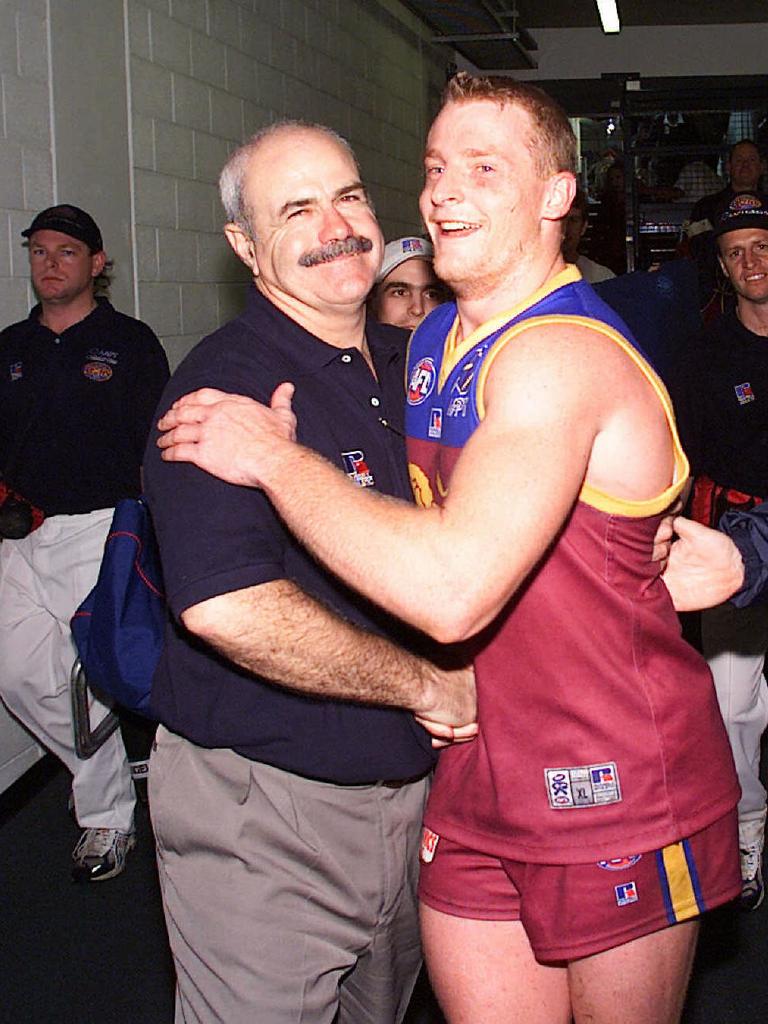
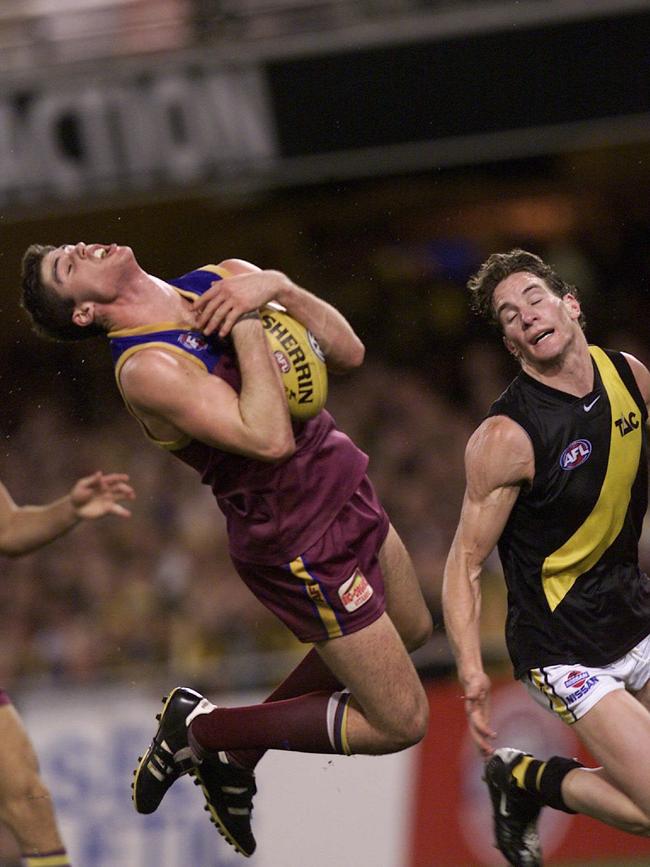
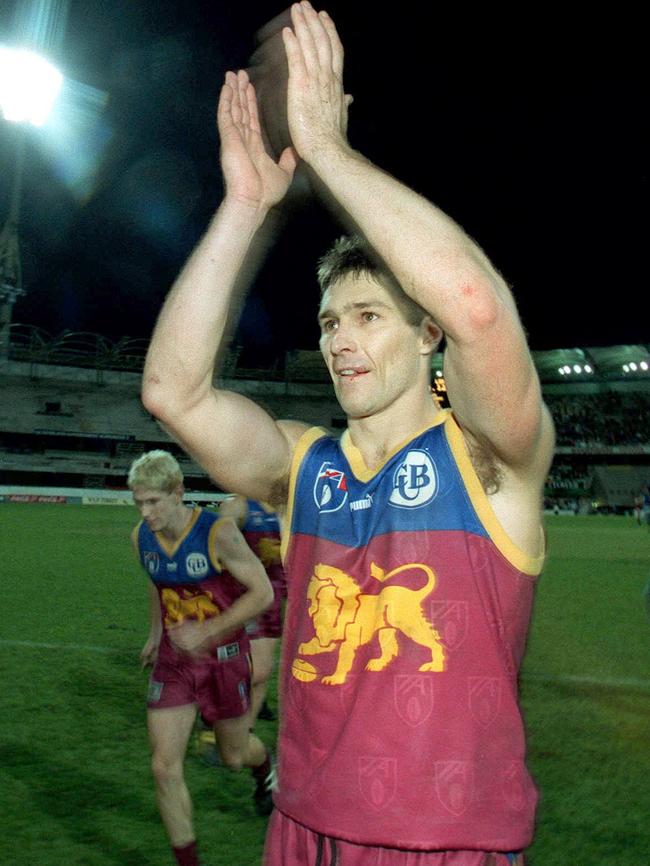
THE GRAND FINAL
Even after their mid-season take-down of the Bombers and their strong path to the Grand Final, Hart felt Essendon was still considered the team to beat.
It was a hot September day at the MCG, which suited the Lions but it was the Bombers who were on top at half-time.
“Essendon got a hold of us, particularly Scott Lucas in the second quarter and he looked like being best on the ground at half-time to be honest,” Hart said.
“We were 20 down, then Lynchy kicked a goal late to make it 14 down at half-time.
“But in the third quarter, we just steamrolled them, we had a six-goal quarter and it was because of the heat I think.
“I reckon James Hird might have been a fair bit wounded as well from the week before.
“We just overwhelmed them with our run and got real confidence in the third quarter and kicked six goals and it was literally all over then in a way because we just overpowered them in all facets of the game.”
At half-time, Matthews always had faith his side could get on top in the second half.
“We were very confident at that point in time in the ability to run a game out,” Matthew said.
“It was a warm day and that suited us because it was going to be taxing. So we were always confident we would run the game out strongly.”
Matthews had been here before as a player and as a premiership-winning coach.
Despite his team’s dominance in the second half, he admits it wasn’t until the final siren that he let himself truly accept the premiership cup was heading to Queensland.
“We got 38 points in front and even in the coaches box about half way through the last quarter I thought ‘Oh god, we’re going to win’ and then Essendon kicked two goals so we are now 26 points in front and all of a sudden the game is still alive,” Matthews said.
“I remember that and there was no count-down clock at that point in time so you didn’t know how long there was to go.
“Basically it was 30 minutes in and we were 26 points in front and the siren went and that was the moment you know you are going to win.
“Up until that stage you assume you are going to win but that was the moment and that is always the best thing in sport, the moment where you accept victory.”
NORM SMITH MEDALLIST
Hart had been well known for his shut-down roles for the Lions.
But on Grand Final day, he played a different role.
“It’s funny, my best role for the team was as a tagger, a lock-down player to shut down the best players in the opposition and take them out of the game,” Hart said.
“Yet on Grand Final day, I played as a half-forward …. I didn’t play the role that I was used to playing most of the season in terms of tagging and shutting down players.
“I played a little bit on the ball as well but it was half-forward where I probably had the most impact for the game.
“I had a good start to the game where I delivered a couple of kicks inside 50 to Alastair Lynch.”.
But Hart, who had an equal game-high 23 disposals in the Grand Final, was unaware of the impact he had on the match.
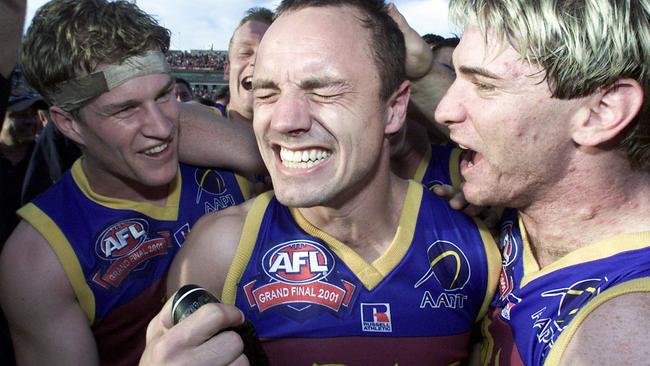
The Lions veteran was in “total shock” when he was told after the game that he might need to say a few words as the winner of the Norm Smith Medal as best on ground.
“To get told you might have a chance to say something, you’re going to get announced as the Norm Smith medallist, I was just so shocked,” Hart said.
“Because of my recollection of the game, if you had asked me what happened right there after the siren I would have said ‘No idea’.
“I might have been able to tell you a kick I did here or a mark I did here, but to be honest it was such a blur. I had no idea about how well I had played until I actually watched the replay and I think I was still one of many good players on the day, not far above probably another batch of eight or 10 players.
“It was just fortunate I had probably one of my best career games on that day.”
After a couple of reds to celebrate the premiership and his Norm Smith win, Hart retreated to the peace of his hotel room to savour the moment.
But he made sure to let it all soak in again the next morning.
“I was the sort of bloke that seriously I was in such a place of joy I just wanted to get away from the real hustle and bustle of people all over you,” Hart said.
“I might have had a couple of red wines I reckon that night then I was back at the hotel having a cup of coffee probably looking forward to getting into bed.
“I do remember getting up the next day, and one thing I will never forget, my jumper stank because it hadn’t been washed but I put it on and literally ran around the oval outside our hotel.
“I ran around a couple of laps jumping for joy, jumping in the air. I just had to do it, I felt like I had to keep celebrating and as smelly as my jumper was I just wanted to show my joy a little bit.”
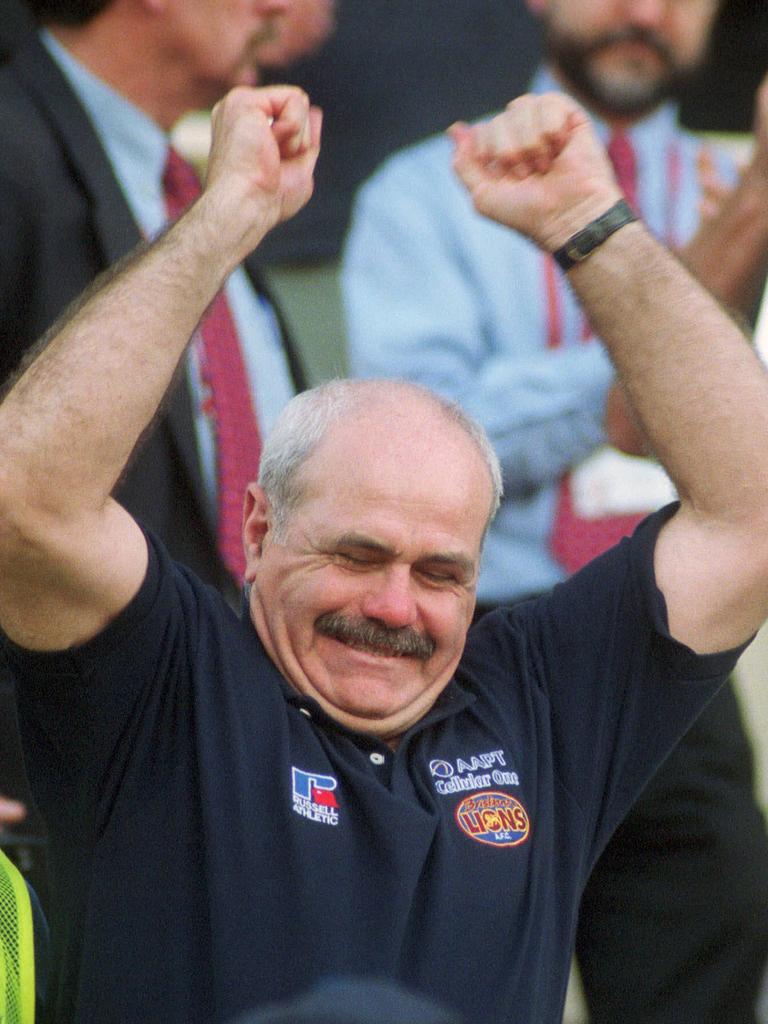
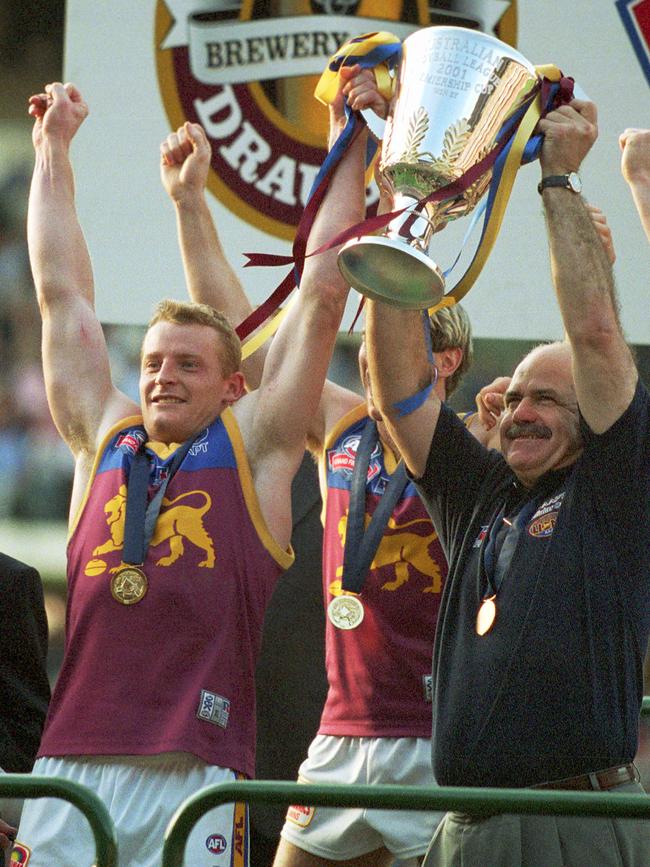
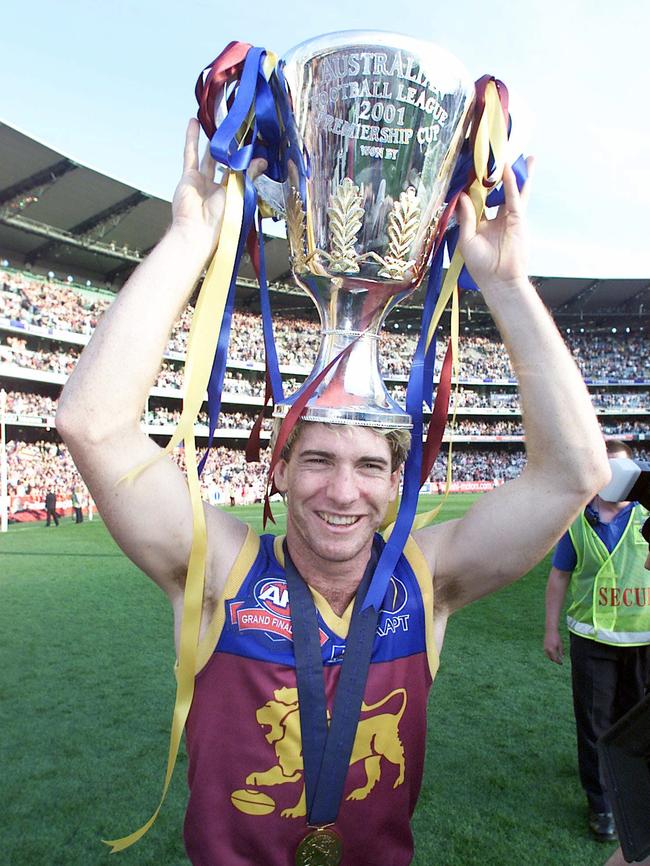
DYNASTY BEGINS
For Lynch, it took months for the idea of being a premiership player to set in.
But although the team’s thoughts soon shifted to how they could get better again the next year, the idea they could win another two consecutive flags was fanciful.
“I remember talking about it when we got back to training for the first time, thinking ‘How good was that experience?’ and then just again setting our task of how we could be better than last year,” Lynch said.
“That was the thing that drove us was improving on individuals, improving how we play and giving ourselves another chance. But I did not think about the era that might be.”
Matthews credits his team “living in the moment” – and a bit of luck – for launching one of the game’s great premiership eras.
“There is probably a lot of luck, I call it the footy gods, but it is the same thing,” Matthew said.
“You need things that can go (right) for you to. We got to the four consecutive Grand Finals with fairly much the same group of players.
“They didn’t allow themselves to get carried away with being premiership players and that enabled them to keep backing up year after year.”

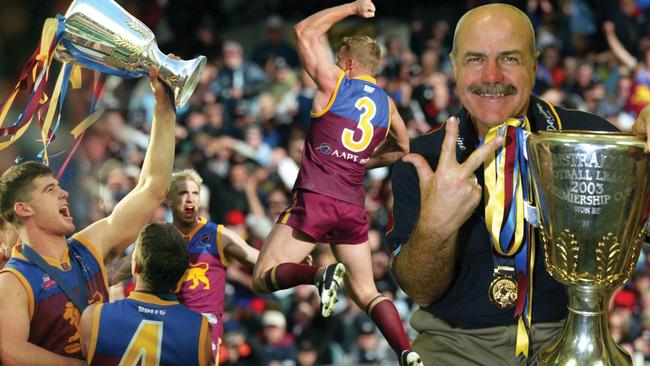
Add your comment to this story
To join the conversation, please log in. Don't have an account? Register
Join the conversation, you are commenting as Logout
Father sons, academy guns: Top 27 talents from exciting 2027 draft crop
The U16 champs have come to a close and the future looks very bright — particularly for Essendon, Port Adelaide and the 19th AFL team. These are the prospects to watch out for from the 2027 draft class.
Daicos, Darcy or JHF? Redrafting the generational AFL class of 2021
The 2021 crop of draftees are already making major splashes across the AFL, but who’s the best? Mick McGuane re-drafts the top 20, and spoiler alert — there’s a new leader of the pack.